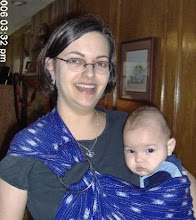Swanson is now waging a legal battle against Sunrise for possession of the placenta. The hospital normally keeps placentas in cold storage for three days, then disposes of them. According to Swanson, the hospital has informed her that it will not release the placenta without a court order, and will destroy it on May 15th. A pro-placenta rally was held on Monday, May 7, and supporters are planning a push for legislation, similar to that passed by Hawaii last year, which would require hospitals to release non-infectious placentas to patients on request. The Hawaiian statute states:
§321-30 Human placenta. Upon negative findings of infection or hazard after appropriate testing of the mother, the human placenta may be released by the hospital to the woman from whom it originated or to the woman's designee. The department shall establish a release form which shall stipulate appropriate measures for the safe release of human placenta.
I know that stopping the spread of infectious disease is serious business, and proper disposal of hospital waste is an important part of that. We don't want needles and body parts thrown in dumpsters, where they might be discovered by dogs, rats, and homeless people. But look at it this way: Baby comes out of mommy's uterus - baby gets taken home. Placenta comes out of mommy's uterus - placenta gets thrown away. Placenta is infectious waste. Baby isn't. Huh? Yes, I know that the baby is a living, breathing human, and the placenta is an organ. But for some people, placental burial is an important religious or cultural ritual, and for others, it is about having control over one's body and retaining ownership of its products.
Now, to turn to the broader legal question: does a person have a property interest in his or her own cells, organs, or body parts? I'm not going to give this question the full treatment, but the leading case on this issue seems to be Moore v. Regents of University of California, 793 P.2d 479, 51 Cal.3d 120 (1990). In this case, university researchers used tissue taken from Moore's diseased spleen to create a cell line which they later patented. The Supreme Court of California held that Moore did not have property rights to or a financial interest in his cells (Wikipedia). Part of the Court's reasoning was that California statutory law restricts a patient's control over his or her medical waste, citing California Health and Safety Code section 7054.4:
[n]otwithstanding any other provision of law, recognizable anatomical parts, human tissues, anatomical human remains, or infectious waste following conclusion of scientific use shall be disposed of by interment, incineration, or any other method determined by the state department [of health services] to protect the public health and safety."
If you are finding this fascinating, you may want to read Ownership of Human Tissue: A Proposal for Federal Recognition of Human Research Participants' Property Rights in Their Biological Material, Wash. & Lee L. Rev. (Winter 2004). I didn't - it was too long and I dont' have the time. But I did get out my bluebook for that cite, which I'm hoping makes up for the fact that a cited to a Wiki a couple paragraphs ago.
Anyhow, hope that give you something to - er - chew on.
Links:
Diva/Mamma (the go-to blog for this case)
Placenta Benefits
Placenta befouled, mom told (Las Vegas Review-Journal)
Making pills from placentas (Las Vegas Review-Journal)
Action News 13 Las Vegas (video)




5 comments:
Thanks for your help in bringing attention to this ongoing situation! I want women to hear about this case - the placenta is an important connection between a mother and her baby that a hospital should not be able to lay claim to and deny them. Placenta is an amazing and powerful natural supplement, used for centuries, that can help a woman recover from childbirth more quickly and make her transition to motherhood less stressful. The medical community is well aware of the health benefits of placenta, and women should be too.
Blessings,
Jodi Selander
diva-mama.com
What is most maddening is that if hospitals etc. simply want placentas to learn from, they're still going to get a good 99% of them--why not let the 1% of women who want to keep theirs do so, if it's no risk to anyone? Ridiculous. So ridiculous that I am tempted to assume the hospital in question is really worried about something else..perhaps other tissue that might be contested as in the California case.
I am trying to get a law passed in Kansas that has to do with the remains of a fetus after a miscarriage. I had a D&E after fetal demise (a whole different issue as my OB didn't inform me I could induce labor and have an intact fetus). I began asking about the remains, but was told, "they go out with the medical waste." Eventually, I found out the remains were incinerated, and who knows where they go after that. I was never informed I could have my baby's remains. I hope for a law allowing mothers to choose how to deal with fetal remains after treatment of miscarriage. If they want them to go to a funeral home instead of a "medical waste" landfill, they should have that right.
Dawn Lewis
Kansas
They say home birth feels better than hospital birth, but that it's more risky. So here's something no one else seems to have thought of:
Deliver your baby in a hospital, and then, after the baby is safely out of you (kein ain hara), go home and deliver the placenta any way you want.
Anon #2 - Am I correct in assuming that you have never given birth or observed a birth? What you suggest would be logistically impossible. I'm not sure if I should dignify your comment with a response, except to say that statistically speaking, home birth is not riskier than hospital birth.
Post a Comment